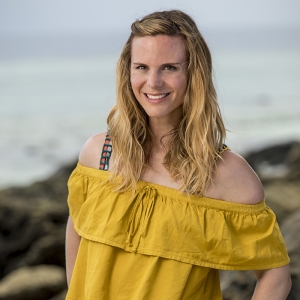How ‘Survivor’ Contestant Roark Luskin Stayed in the Game with Her MSW Training
November 08, 2017- Students
A longtime reality-TV-fan-turned contestant, this MSW student plays “Survivor’s” social game like a pro.
Here at the USC Suzanne Dworak-Peck School of Social Work, we know Roark Luskin as a student working toward her MSW degree — but to most of the world, she has become best-known as a contestant on Season 35 of CBS’s “Survivor.”
As a member of the “Healers” tribe, Luskin used her training as a social worker to build meaningful relationships with her teammates — and has in turn gained invaluable skills during the competition that she can apply to her studies.
USC Suzanne Dworak-Peck School of Social Work: First things first: what inspired you to audition for “Survivor”? Where were you in your MSW program when you decided to audition?
Roark Luskin: I actually applied for “Survivor” before I even started at USC. I sent a video into the ether and thought no one would ever see it, but one day, I got the call.
I’ve spent most of my life in school or at work. I never studied abroad or took the time to do something off the beaten path. But I still wanted that experience, so I thought, what would an elite study abroad program look like? Why not a competition where you could win a million dollars?
I’ve always been a fan of “Survivor.” I knew I couldn’t do something like “Naked and Afraid,” which is geared towards hardcore survivalists. But the challenges in “Survivor” seemed achievable, and I had the social prowess to handle the team dynamics. So much of “Survivor” is getting people on your side and getting them to like you.
USC: This season features 18 players divided into three tribes based on their dominant perceived trait: "Heroes" (courage), "Healers" (helping others) and "Hustlers" (tenacity). Can you tell us about your Healer teammates, and how you think you fit into the mix as a social worker?
RL: During my entire “Survivor” experience, there was nothing like those first few days with the Healers. We were such a fun group. The Healers are all about teamwork — making sure that everyone has what they need. We all had so much in common; most of us have dedicated our lives to helping others and have pursued advanced degrees. We had a lot of respect for each other and the work we’ve put into our careers.
All of us were proud to wear the Healer moniker — there’s nothing negative about it. We had a doctor, a nurse practitioner, a physical therapist and others. We all embody the word “healer” in different ways.
USC: A huge element of success on “Survivor” is creating connections with your teammates and competitors. How did the skills you've developed during the MSW program factor into that?
RL: As a social worker, we learn to tap into our clients’ motivation for doing something instead of telling them what to do. That ended up being a key component to success on “Survivor.” At the end of the day, if you want your teammate to do something, you have to figure out what will drive them to do it.
How does someone pull that off? You engage with your teammates. You use a lot of reflective language when you’re trying to make plans. Bonding with your teammates is all well and good, but the important moments happen during plan formation, when you find out how other people think and why they think that way. Social workers also learn to remain neutral and even-keeled, even in difficult situations. No matter what happens, we strive to be empathetic and supportive.
USC: Were there any moments that were surprising? Any challenges that you didn’t anticipate?
RL: There’s an element of luck involved for every “Survivor” contestant. I felt very prepared to actually play the game, but at one point I was dealt a bad hand. I absolutely have regrets and there are things I would do differently, but I think that the circumstances were stacked against me.
Having strong social skills can be a strength, but it can also be a weakness. When tribe members choose who to vote off the island, they can eliminate weaker teammates who might struggle in future challenges, or pick stronger ones that they perceive to be a threat. It seems like Ryan — the deciding vote in my case — was convinced that I was a threat.
USC: Now that you're back at USC and on the home stretch to graduation, what is the most valuable lesson that you will bring back with you?
RL: “Survivor” reminded me that it’s counterproductive to not be yourself. It’s clear to the people who know me that I think strategically, and I tried to mask that as much as I could. But on the show, everyone saw right through that. I have to assume that those parts of me will always come through, in every aspect of my life.
That knowledge has definitely affected the way that I interact with clients. I don’t self-disclose and I remain neutral, but I can still employ my own clinical style. For example, I work at a partial hospitalization program for kids at the UCLA hospital. There’s another social worker there who’s very placid and slow-speaking. That’s her style, but I don’t need to imitate that; I prefer to be more humorous and joke-y. We have similar skillsets and are dealing with similar types of clients, but we approach things differently. “Survivor” has allowed me to embrace my independence.
Luskin was eliminated on Episode 5 of the current season of “Survivor.”
To reference the work of our faculty online, we ask that you directly quote their work where possible and attribute it to "FACULTY NAME, a professor in the USC Suzanne Dworak-Peck School of Social Work” (LINK: https://dworakpeck.usc.edu)
